Theatre Preview: Saved
Sarah Grice interviews the team behind Saved to explore the issues raised by their controversial play
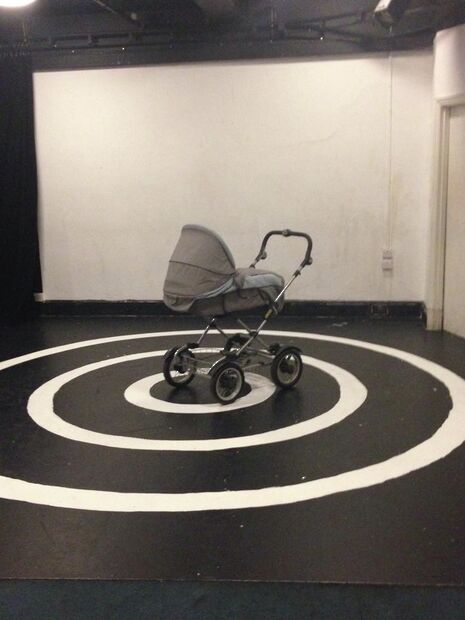
What made you want to stage this particular play?
Jack: Firstly to redress an imbalance within the Cambridge theatre scene, which is often geared towards more classical texts. There aren’t as many plays like Saved, which represent working class lives and working class characters. What [the writer] Edward Bond does in this depiction is very innovative, very shocking and very violent. I wanted to stage something that really challenges an audience – and I think it’s a play that it is impossible not to have an opinion about.
What are you anticipating audience responses to be? Do you think that people will come just for the controversy? Are you expecting walk-outs?
Jack: Well, the play doesn’t have a very good track record in that sense. I don’t know how easily offended audiences here will be. I also don’t know how informed they will be of the context and content of the play. And of course there is that particular scene, the stoning of the baby, which is completely repellent. I think it is our job as a company to be able to bring that scene to an audience while teasing out the other questions in the play. We do not want them to be offended in a ‘knee-jerk’ way and simply walk out. Ideally an audience will believe enough in the work itself to watch that scene and take it on.
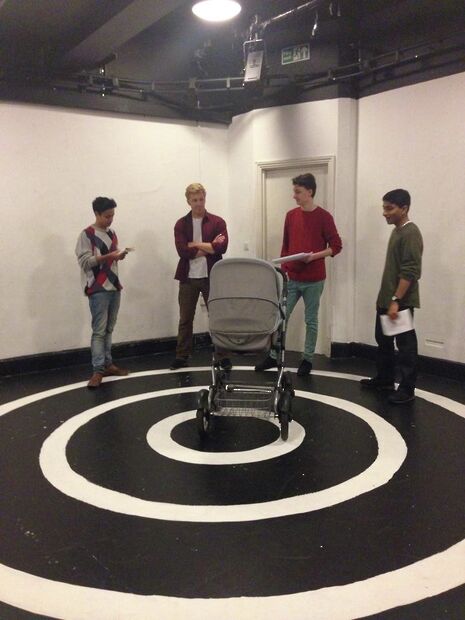
So that pivotal scene – the notorious stoning of the baby. Without giving too much away, could you tell me a bit about what you have chosen to do with it as a director and as actors?
Jack: I believe that it is only significant because of what happens around it. Structurally speaking, the fact that it’s not the last scene before the interval is very important. Bond doesn’t give the audience a reprieve just yet. In the following scene we see Fred, one of the perpetrators, in a prison cell with Pam his girlfriend, and Len, who was present at the stoning. I think the lack of tenderness or remorse with which the event is treated is actually the most challenging thing. We don’t have anything that pays respect or homage to the life of that child.
Gabriel: You’re not allowed to sit back and breathe, or take it in.
Tara: It’s a really long scene as well [the stoning] in comparison to the other scenes in the play. I think it’s the longest. It can almost be divided up into separate sections in itself and is almost relentless. It is uncompromising.
What would you say those specific sections are and how do they work?
Tara: Without giving too much away, I suppose you are in a way set up for what’s about to happen, but not in a very obviously leading or melodramatic way. I think it will come as a shock, even if you can see what’s coming. There is in a sense, a build up but then I think Bond denies us the normal climax that we would want and expect.
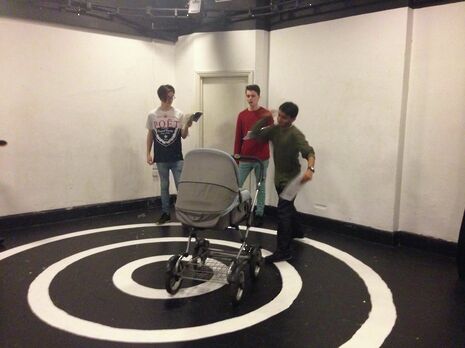
I think an intriguing thing about the play is that while the stoning scene is at the centre of the dramatic action and is the most obviously shocking event, there is still a lot in the play that is very quietly shocking – such as the domestic violence. How do you think the effects vary between such outwardly shocking violence and the consistent verbal and emotional abuse?
Jack: That’s almost exactly what we found when working with these other scenes. They seem less obviously traumatic to watch and to stage. In fact they are as disturbing.
How did you find that as actors in rehearsal?
Gabriel: I think that a scene in which nothing happens is often a lot more powerful than a scene in which everything happens. There are loads of domestic scenes in which you have this distorted family and no one speaks to each other. It is absolutely silent and the only dialogue takes the form of meaningless words to fill in that silence.
Tara: I think the silence is the hardest to maintain. There are so many and they have to be so long.
Especially the final scene of the play – isn’t there only one line of dialogue?
Jack: The last line of the play is that one line: "Fetch me the hammer." It’s a strange parting note. I do think that the more provocatively violent scenes are symptomatic of the things we witness in the domestic scenes. We see the characters to have a fundamental apathy and lack of understanding of their place in the world and as part of a family. I think Bond is saying that if people aren’t encouraged to explore themselves, to think of each other as valuable and sentient human beings, this is the kind of violence that will emerge.
That is an extreme message. Do you think it is a kind of prophetic warning? Is Bond is saying that poverty breeds this destructive combination of apathy and aggression?
Jack: The fact that this play was written in 1965 and can be staged today without anyone thinking ‘Oh, that’s not a problem’ says it all. It was prophetic and it continues to be prophetic. It’s a very depressing thing to acknowledge.
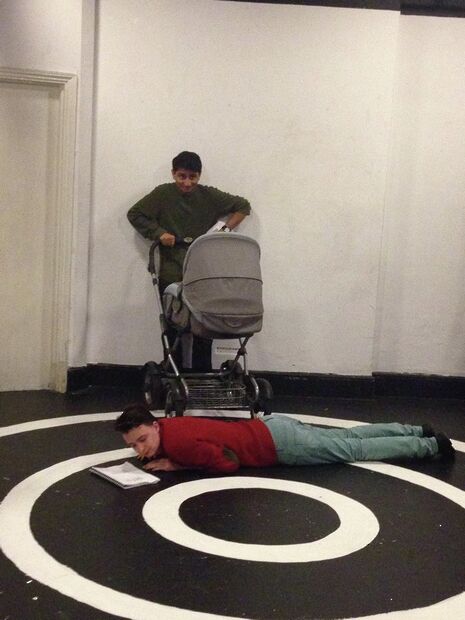
Are you setting the play in the sixties or bringing it forward to the present day?
Jack: It is difficult because some of the language seems slightly archaic, but we are setting it in 2014 to all intents and purposes. Under the instruction of Edward Bond himself actually. He said it is a bad idea to for any production to set it in the sixties because it means you are avoiding the issue. It lets the audience off a lot if they experience it as a relic.
Which ties in with what Olivier said about that play - that it takes a lot of courage to watch it. Do you believe that it takes a certain kind of bravery to watch Saved set in your own time?
Jack: I think it does. I think you have to be thick-skinned as an audience member to engage with ‘Saved’ and I can understand why some people won’t. It is inevitable that people will be affected by it. I think the aim is for the play to produce a response that accounts for the things that happen in the play, so that they are not merely repelled by it. But I do think that you have to be both brave and willing to take this play on.
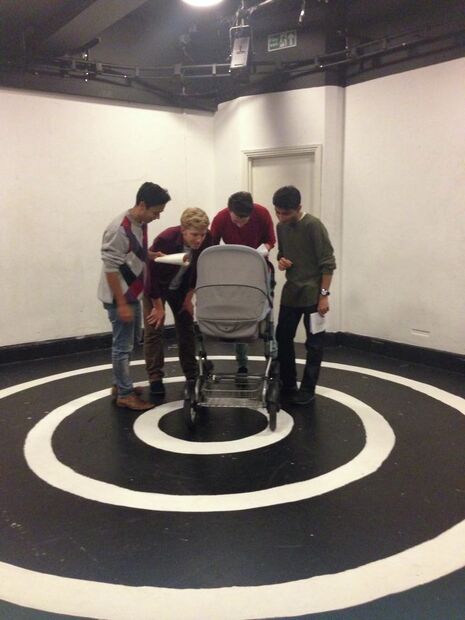
Do you think that despite the violence, it is a moral play?
Jack: Yes, hugely!
Tara: I don’t think Bond is trying to proscribe you a lesson or a set of morals – it goes beyond that. We all know that killing a child is wrong. It is more that he is asking us to question how we feel about the responses the characters have to this horrible event and why. By interrogating our own feelings, we find out where our morals sit.
Gabriel: While Saved is a very moral play, there is no moral centre. There is no one in the play who is a hundred percent good – so it is very realistic in that way. You have, Len who is arguably the most moral character. But equally, as an audience member, or when playing Len, you just want to shake him and tell him to do something.
Jack: Edward Bond said he thinks that it is immoral not to write about violence. And I think that in a way that’s all that needs to be said, about whether a play should be banned or not for being violent. As long as violence continues to exist in the world, surely it is an immoral decision to omit that for the sake of polite spectators?
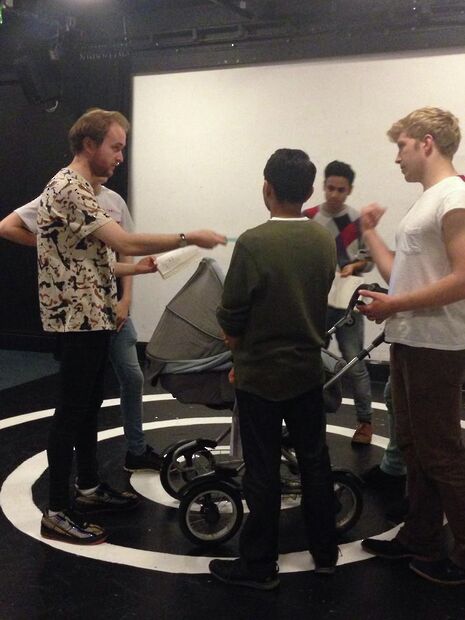
Saved by Edward Bond is on at Corpus Playroom at 7pm from Tues 21 – Sat 25 October 2014.
 News / Fitz students face ‘massive invasion of privacy’ over messy rooms23 April 2024
News / Fitz students face ‘massive invasion of privacy’ over messy rooms23 April 2024 News / Climate activists smash windows of Cambridge Energy Institute22 April 2024
News / Climate activists smash windows of Cambridge Energy Institute22 April 2024 News / Copycat don caught again19 April 2024
News / Copycat don caught again19 April 2024 Comment / Gown vs town? Local investment plans must remember Cambridge is not just a university24 April 2024
Comment / Gown vs town? Local investment plans must remember Cambridge is not just a university24 April 2024 News / Emmanuel College cuts ties with ‘race-realist’ fellow19 April 2024
News / Emmanuel College cuts ties with ‘race-realist’ fellow19 April 2024




